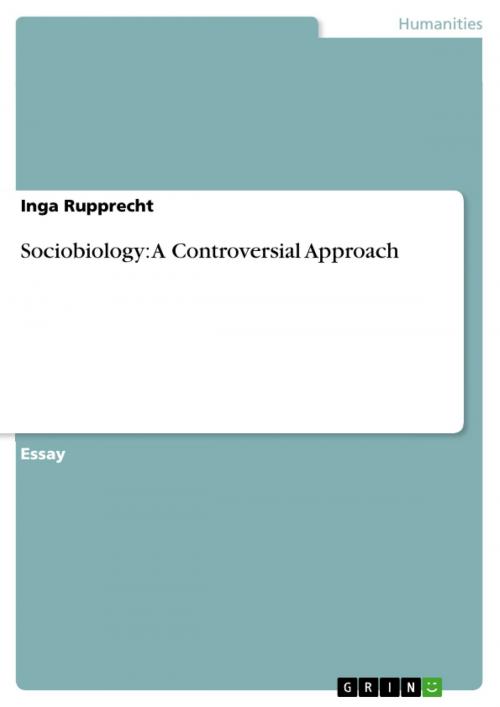| Author: | Inga Rupprecht | ISBN: | 9783638570879 |
| Publisher: | GRIN Publishing | Publication: | November 19, 2006 |
| Imprint: | GRIN Publishing | Language: | English |
| Author: | Inga Rupprecht |
| ISBN: | 9783638570879 |
| Publisher: | GRIN Publishing |
| Publication: | November 19, 2006 |
| Imprint: | GRIN Publishing |
| Language: | English |
Essay from the year 2006 in the subject Sociology - Individual, Groups, Society, grade: 1,3 (A), University of Lincoln (ESSD Division), course: Social Theory, 16 entries in the bibliography, language: English, abstract: The question as to how far biological factors, or more specifically genes, influence our human behaviour and consequently social phenomena, for example the foundation of a family, is fascinating for science and public; especially since the discovery of the human genes. Nevertheless, there are still great controversies between social scientists and adherents of sociobiology concerning the central question; if it is culture and self-consciousness respectively, or genes that dominate human social behaviour. Even though Max Weber already recognized that our biological heredity may have an impact on social phenomena, he did not regard biology as sufficiently developed enough to be really helpful for sociology. (Kaye, 1986) It was in 1975 when Edward O. Wilson's book 'Sociobiology: The New Synthesis' became the trigger for new public discussions about how far, if at all, concepts of biological evolution could be relevant for explaining social behaviour in human societies. The term 'sociobiology' constitutes a concept which can be described as a synthesis of neo-Darwinism ('survival of the fittest' combined with Mendel's laws of heredity) and ethology (the study of behaviour). (Gregory, 1979) The problem with Wilson's work was that, although he focused mainly on animal societies, he claimed that his findings were valid for human beings as well. (Wilson, 1979 in Gregory et al.; Wallace and Wolf, 2006) The reactions of social scientists and the scientific media reached from 'deep scepticism' (Goldsmith, 1991: Preface) and 'stiff resistance'. In this essay I will first have a look at the general assumptions and arguments of sociobiologists and how they want to intertwine biological and sociological explanations of human behaviour and social structures. After that I will discuss the manifold criticisms which were made by opponents of the sociobiological approach and compare some of them directly with responses of sociobiologists. To get a general idea of the possible contributions sociobiology can make to social science in explaining human beings' social behaviour biologically, I will describe some research areas of the perspective. I am also going to show that altruism is phenomenon which causes explanatory difficulties. In the conclusion at the end of the essay the possible contributions of sociobiology to social science and the explanation of human behaviour should be considered.
Essay from the year 2006 in the subject Sociology - Individual, Groups, Society, grade: 1,3 (A), University of Lincoln (ESSD Division), course: Social Theory, 16 entries in the bibliography, language: English, abstract: The question as to how far biological factors, or more specifically genes, influence our human behaviour and consequently social phenomena, for example the foundation of a family, is fascinating for science and public; especially since the discovery of the human genes. Nevertheless, there are still great controversies between social scientists and adherents of sociobiology concerning the central question; if it is culture and self-consciousness respectively, or genes that dominate human social behaviour. Even though Max Weber already recognized that our biological heredity may have an impact on social phenomena, he did not regard biology as sufficiently developed enough to be really helpful for sociology. (Kaye, 1986) It was in 1975 when Edward O. Wilson's book 'Sociobiology: The New Synthesis' became the trigger for new public discussions about how far, if at all, concepts of biological evolution could be relevant for explaining social behaviour in human societies. The term 'sociobiology' constitutes a concept which can be described as a synthesis of neo-Darwinism ('survival of the fittest' combined with Mendel's laws of heredity) and ethology (the study of behaviour). (Gregory, 1979) The problem with Wilson's work was that, although he focused mainly on animal societies, he claimed that his findings were valid for human beings as well. (Wilson, 1979 in Gregory et al.; Wallace and Wolf, 2006) The reactions of social scientists and the scientific media reached from 'deep scepticism' (Goldsmith, 1991: Preface) and 'stiff resistance'. In this essay I will first have a look at the general assumptions and arguments of sociobiologists and how they want to intertwine biological and sociological explanations of human behaviour and social structures. After that I will discuss the manifold criticisms which were made by opponents of the sociobiological approach and compare some of them directly with responses of sociobiologists. To get a general idea of the possible contributions sociobiology can make to social science in explaining human beings' social behaviour biologically, I will describe some research areas of the perspective. I am also going to show that altruism is phenomenon which causes explanatory difficulties. In the conclusion at the end of the essay the possible contributions of sociobiology to social science and the explanation of human behaviour should be considered.















